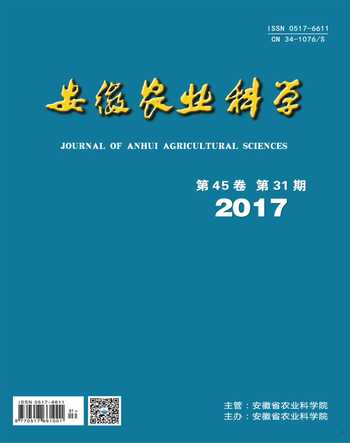不同来源山羊体细胞重编程效率比较
2017-05-30宋辉李卉王锋
宋辉 李卉 王锋



摘要 [目的]检测克隆奶山羊(♀12003)和转基因克隆奶山羊(♂12001)作为供体细胞,对体细胞重编程效率的影响。[方法]采用慢病毒作为载体,携带多能因子来感染正常山羊(g2)、♀12003和♂12001体细胞,统计克隆形成率和碱性磷酸酶阳性克隆率。[结果] 与普通山羊(g2)相比,转基因克隆奶山羊耳成纤维细胞的重编程效率低,出现的细胞克隆在传代之前容易分化;克隆奶山羊体细胞与普通山羊体细胞的重编程效率接近,转基因克隆奶山羊(♂12001)的重编程效率极显著低于克隆奶山羊(♀12003)和普通山羊(P<0.01)。[结论]转基因克隆奶山羊体细胞可以被重编程为诱导性多能干細胞(Induced pluripotent stem cells,iPSCs),但效率较低。
关键词诱导性多能干细胞;重编程;克隆羊
中图分类号S827文献标识码A文章编号0517-6611(2017)31-0115-03
Abstract[Objective] To study the effects of cloned dairy goat (♀12003) and transgenic cloned dairy goat (♂12001) as donor cells on somatic cell reprogramming efficiency. [Method]The lentivirus was used as carrier to carry the pluripotent factor to infect the somatic cells of normal goat (g2), ♀12003 and ♂12001. And the clonal formation rate and alkaline phosphatase positive clone rate were recorded. [Result] Compared with the normal goat (g2), the reprogramming efficiency of ear fibroblasts of the transgenic cloned dairy goat was lower, and the cell clones appeared to be easily differentiated before passage. The reprogramming efficiency of cloned dairy goat′s somatic cells was close to that of the normal goat′s somatic cell. The reprogramming efficiency of transgenic cloned dairy goat (♂ 12001) was significantly lower than that of cloned dairy goat (♀12003) and common goat (P<0.01). [Conclusion] Transgenic cloned dairy goat′s somatic cells could be reprogrammed into induced pluripotent stem cells (iPSCs), but the efficiency was low.
Key wordsInduced pluripotent stem cells;Reprogramming;Cloned goat
转基因技术是研究基因功能的常用方法之一,在建立人类遗传疾病模型、动物品种改良、药用蛋白生产等领域也具有极大的开发价值。目前常用的生产转基因动物的方法效率很低,工作繁锁,周期长。以胚胎干细胞(Embryonic stem cells,ESCs)作为核供体细胞,通过核移植技术生产转基因动物,可以极大地提高成功率。然而,由于开始使用的材料有各种问题,比如胚胎自身的原因、在体外对ESCs开始的处理以及对ESCs后期的培养条件等因素的影响,偶蹄类动物严格意义上的ESCs系一直无法成功建立。这些都制约了偶蹄类家畜ESCs的研究及应用。
诱导性多能干细胞(iPSCs)技术的产生为研究偶蹄类动物的多能干细胞提供了一个很好的思路。猪、牛、绵羊和山羊的iPSCs相继建系成功[1-13]。南京农业大学江苏省肉羊产业工程技术研究中心已经成功获得批量转基因克隆奶山羊,经检测发现转人乳铁蛋白(hLF)基因已经很好地整合到这些克隆奶山羊体细胞的基因组中。笔者用克隆奶山羊和转基因克隆奶山羊耳成纤维细胞作为体细胞,经过慢病毒感染进行重编程,统计克隆形成率和碱性磷酸酶阳性克隆率,旨在为今后使用转基因克隆奶山羊iPSCs作为供体细胞通过核移植技术高效率生产转基因克隆奶山羊奠定基础。
1材料与方法
1.1主要试剂
DMEM培养基、DMEM/F12培养基、胎牛血清(FBS)、非必需氨基酸(NEAA)、双抗、无钙镁PBS缓冲液、胰蛋白酶、谷氨酰胺、β-巯基乙醇(β-ME)均购自美国Life公司;丝裂霉素-C(MIT-C)购自瑞士Roche公司;成纤维细胞生长因子(β-FGF)购自美国Peprotech公司;碱性磷酸酶染色试剂盒购自美国Millipore公司。
1.2方法
1.2.1hLF基因的检测。提取山羊♂12001细胞DNA,采用PCR方法对其进行鉴定,PCR反应体系(50 μL)如下:10×PCR Buffer 5 μL,10 mmol/L dNTP Mixture 8 μL,上、下游引物各20 pmol,LA Taq DNA聚合酶0.5 μL,25 mmol/L Mg2+ 4 μL,cDNA产物2 μL,补加ddH2O至50 μL。PCR反应程序如下:94 ℃变性5 min;94 ℃变性15 s,60 ℃退火30 s,72 ℃延伸1 min,40个循环;最后72 ℃延伸5 min。设计1对引物:F为5′-GAATGGCTGGCAGTGAAACA-3′,R为5′-CTCAATGGGCTCAGGTGGAC-3′。
1.2.2
hLF基因克隆至T载体。回收RT-PCR扩增产物,进行纯化后,克隆在pMD-19T载体的T位点。纯化后的PCR产物4 μL,Buffer 2 μL,pMD-19T 1 μL,T4 DNA连接酶1 μL,加水至10 μL,16 ℃过夜。将连接产物转化感受态细胞TOP10,随机挑取单克隆,扩增后进行PCR。将鉴定正确的重组质粒进行测序分析。
1.2.3碱性磷酸酶染色。碱性磷酸酶检测使用密理博公司的碱性磷酸酶染色试剂盒,按照说明书操作,具体步骤如下:吸弃6孔板中的培养基,PBS清洗3次;加入4%多聚甲醛溶液固定2 min;1 × Rinsebuffer清洗2次;加入AP染色液避光孵育15 min(AP染色液现用现配,FastRed Violet∶Naphthol-BIphosphatesolution∶H2O=2∶1∶1)。吸弃染色液,1×Rinsebuffer 清洗2次。加入PBS,拍照并计算诱导效率。
1.2.4
比较不同来源山羊耳成纤维细胞重编程产生克隆效率和克隆质量。将病毒感染后的体细胞用胰蛋白酶消化铺在铺有饲养层的细胞培养皿上,每个皿铺1×105个细胞,每组做3个重复孔。12~15 d后,在显微镜下统计每个皿出现的总克隆数,随后对每个皿进行AKP染色。统计每个皿中AKP阳性克隆数,最后统计总克隆数和AKP阳性克隆数占铺在对应培养皿上感染细胞数的比例。
2结果与分析
2.1细胞转基因鉴定
通过PCR检测山羊♂12001细胞DNA,结果表明通过PCR可以检测到目的基因hLF,♀5和♀6为普通奶山羊,作为阴性对照(图1),测序结果表明PCR扩增的片段与hLF基因序列相一致。
2.2碱性磷酸酶(AKP)染色
通过AKP检测,在显微镜下
可观察到细胞的胞浆内有红棕色颗粒,说明克隆奶山羊(♀12003)和转基因克隆奶山羊(♂12001)iPSCs对AKP染色呈阳性(图2)。
2.3不同来源山羊耳成纤维细胞重编程产生克隆效率和克隆质量的比较
与普通山羊相比,转基因克隆奶山羊耳成纤维细胞的诱导效率低,出现的细胞克隆在传代之前容易分化(有的在克隆刚产生的时候就开始分化)。在诱导效率和克隆质量方面,转基因克隆奶山羊(♂12001)3次重复试验的平均阳性AKP克隆率为(0.003±0.006)%,显著低于克隆奶山羊[(0.027±0.015)%]和地方品种山羊[(0.030±0010)%](表 1,图3,P<0.01)。从图3可以看出,普通山羊(g2)和克隆奶山羊(♀12003)重编程效率均极显著高于转基因克隆奶山羊(♂12001)(P< 0.01),普通山羊(g2)和克隆奶山羊(♀12003)重编程效率沒有显著差异(P>0.05)。
3结论与讨论
ESCs替代普通体细胞作为核供体细胞,可以有效提高SCNT的效率,从而提高偶蹄类家畜的生产特性[14-17]。但是,偶蹄类家畜ESCs一直没有建系成功。iPSCs是一个建立偶蹄类家畜多能干细胞系的新方法。因此,iPSCs可以代替
ESCs作为供体细胞进行核移植,提高克隆率。许多家畜的
iPSCs已经建立成功,包括山羊[1]、绵羊[2-4]、猪[8-9,11,13]和
牛[5-7]。研究人员已经通过核移植技术,使用小鼠和猪的iPSCs作为供体细胞获得相应的克隆动物[10,18-19]。由此可见,iPSCs为生产转基因克隆动物提供了一个有用的工具。笔者所在实验室已经通过体细胞核移植技术,使用带有人乳铁蛋白(hLF)基因的奶山羊皮肤成纤维细胞作为供体细胞,成功获得转基因克隆奶山羊,但效率很低[20]。在转基因过程中,外源基因整合到体细胞的基因组中;在体外,因为核移植的操作对细胞产生伤害和应激等,会导致转基因克隆动物发生异常。因此,该研究使用慢病毒为载体将转基因克隆奶山羊体细胞重编程为iPSCs,作为下一步生产克隆羊的供体细胞,以期提高克隆羊的克隆率及克隆质量。
iPSCs有多种方法来评估重编程的效率,从实际操作角度来看,大多数研究人员使用克隆计数这种方法统计重编程的效率[21]。该研究采用碱性磷酸酶活性染色与克隆计数相结合的方法统计重编程效率,获得了更为准确的山羊成纤维细胞的重编程效率。使用转基因克隆奶山羊耳成纤维细胞(tgFs)重编程后获得的AKP阳性克隆数显著低于使用奶山羊耳成纤维细胞重编程后获得的AKP阳性克隆数(P<001)。与普通奶山羊耳成纤维细胞相比,使用tgFs进行重编程要困难的多。大多数tgFs重编程后产生克隆会发生快速的分化,这可能与转基因羊的供体细胞经过基因改造,外源基因整合到体细胞的基因组中,导致其重编程机制发生改变造成的。
参考文献
[1] REN J T,PAK Y J,HE L X Z,et al.Generation of hircineinduced pluripotent stem cells by somatic cell reprogramming[J].Cell Res,2011,21:849-853.
[2] BAO L,HE L X Z,CHEN J J,et al.Reprogramming of ovine adult fibroblasts to pluripotency via druginducible expression of defined factors[J].Cell Res,2011,21(4):600-608.
[3] LI Y,CANG M,LEE A S,et al.Reprogramming of sheep fibroblasts into pluripotency under a druginducible expression of mousederived defined factors[J].PLoS One,2011,6:1-8.
[4] LIU J,BALEHOSUR D,MURRAY B,et al.Generation and characterization of reprogrammed sheep induced pluripotent stem cells[J].Theriogenology,2012,77(2):338-346.
[5] DENG Y F,LIU Q Y,LUO C,et al.Generation of induced pluripotent stem cells from buffalo(Bubalus bubalis)fetal fibroblasts with buffalo defined factors[J].Stem Cells Dev,2012,21(13):2485-2494.
[6] HAN X P,HAN J Y,DING F R,et al.Generation of induced pluripotent stem cells from bovine embryonic fibroblast cells[J].Cell Res,2011,21:1509-1512.
[7] HUANG B,LI T,ALONSOGONZALEZ L,et al.A virusfree polypromoter vector induces pluripotency in quiescent bovine cells under chemically defined conditions of dual kinase inhibition[J].PLoS One,2011,6(9):1-14.
[8] ESTEBAN M A,XU J Y,YANG J Y,et al.Generation of induced pluripotent stem cell lines from Tibetan miniature pig[J].J Biol Chem,2009,284(26):17634-17640.
[9] EZASHI T,TELUGU B P,ALEXENKO A P,et al.Derivation of induced pluripotent stem cells from pig somatic cells[J].Proc Natl Acad Sci USA,2009,106(27):10993-10998.
[10] FAN N N,CHEN J J,SHANG Z C,et al.Piglets cloned from induced pluripotent stem cells[J].Cell Res,2013,23:162-166.
[11] WU Z,CHEN J J,REN J T,et al.Generation of piginduced pluripotent stem cells with a druginducible system[J].J Mol Cell Biol,2009,1:46-54.
[12] LIU K,JI G Z,MAO J,et al.Generation of porcineinduced pluripotent stem cells by using OCT4 and KLF4 porcine factors[J].Cell reprogram,2012,14(6):505-513.
[13] MONTSERRAT N,DE OATE L,GARRETA E,et al.Generation of feederfree pig induced pluripotent stem cells without Pou5f1[J].Cell transplantation,2012,21(5):815-825.
[14] RIDEOUT W M Ⅲ,WAKAYAMA T,WUTZ A,et al.Generation of mice from wildtype and targeted ES cells by nuclear cloning[J].Nat Genet,2000,24:109-110.
[15] KEEFER C L.Production of bioproducts through the use of transgenic animal models[J].Anim Reprod Sci,2004,82/83:5-12.
[16] DONOVAN D M,KERR D E,WALL R J.Engineering disease resistant cattle[J].Transgenic Res,2005,14(5):563-567.
[17] WALL R J,POWELL A M,PAAPE M J,et al.Genetically enhanced cows resist intramammary Staphylococcus aureus infection[J].Nat biotechnol,2005,23(4):445-451.
[18] ZHOU S,DING C,ZHAO X,et al.Successful generation of cloned mice using nuclear transfer from induced pluripotent stem cells[J].Cell Res,2010,20:850-853.
[19] KOU Z H,KANG L,YUAN Y,et al.Mice cloned from induced pluripotent stem cells(iPSCs)[J].Biol Reprod,2010,83(2):238-243.
[20] WAN Y J,ZHANG Y L,ZHOU Z R,et al.Efficiency of donor cell preparation and recipient oocyte source for production of transgenic cloned dairy goats harboring human lactoferrin[J].Theriogenology,2012,78(3):583-592.
[21] MAHERALI N,AHFELDT T,RIGAMONTI A,et al.A highefficiency system for the generation and study of human induced pluripotent stem cells[J].Cell stem cell,2008,3(3):340-345.
